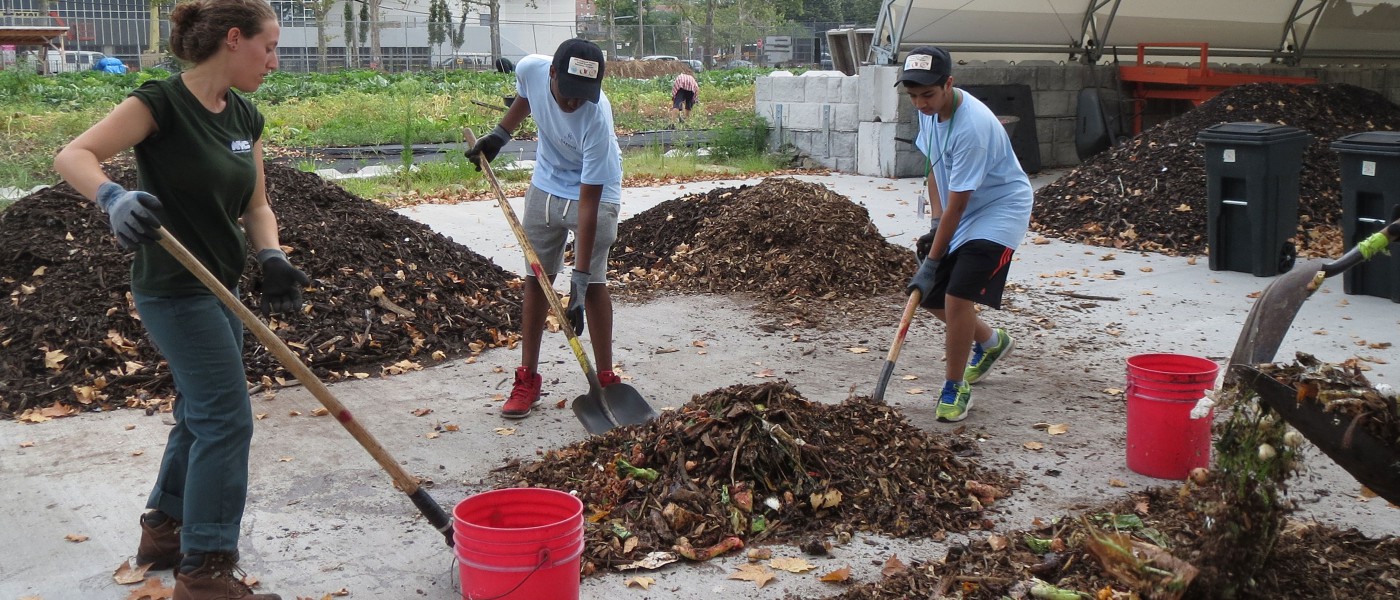This Earth Day, Consider the Compost Pile
Wondering how you should celebrate Earth Day? Take a moment to brush up on your composting know-how. Composting offers a ton of environmental and community benefits—and for New Yorkers hoping to sustainably manage their waste and care for urban landscapes, there are new opportunities to learn about.
Why Compost?
First, a quick primer: Composting refers to the act of managing organic waste matter—such as food scraps, leaves, and animal products—to speed up its decomposition into a nutrient-rich soil amendment. When we take basic steps to regulate airflow, moisture, and ingredient mixes in a compost pile, beneficial bacteria, fungi, and other organisms work to break down our scraps quickly and efficiently.
There are many good reasons to compost. Properly recycling food scraps reduces the amount of waste that goes to landfills and incinerators, where it can produce harmful greenhouse gases like methane and excess carbon dioxide. Finished compost replenishes soils used to grow plants, reducing the need for synthetic fertilizers and pesticides that can have negative impacts on human health and ecosystems. And applying compost helps conserve water by improving the moisture-holding capacity of soil and reducing runoff and erosion.
What to Know Now About Composting in NYC
This year has been a momentous one for NYC residents who are eager for new and easier ways to recycle their food scraps and yard waste. The expansion of the Department of Sanitation’s Food Scrap Drop-off network has continued with the launch of 24/7 Smart Composting Bins in all five boroughs. Residents can now drop everything from meat and dairy to garden trimmings into these bins on their own time, day or night. Curbside Composting will also be rolled out to all New Yorkers over the next year and a half. Get ready to place all compostable items by the curb with your paper and plastic!
The material collected from the smart bins and curbside program—including greasy foods and soiled paper—will be turned into compost at facilities in the New York area or turned into electricity for powering homes in Brooklyn’s famous Newtown Creek Anaerobic Digester Eggs. To access finished compost, check the Department of Sanitation’s website for an updated list of locations. You can also buy compost from local organizations like BK ROT.
Caring for Street Trees with Compost
If you have access to a yard, community garden, or even potted plants, finished compost can be used to improve your soil. And as Brooklyn Botanic Garden embarks on this year’s celebration of trees, it’s worth highlighting another application for compost: helping street trees in New York City grow healthier and stronger.
Street trees face many challenges, including poor soil conditions, limited space, drought stress, pollution, pests, diseases, and vandalism. Compost can provide them with nutrients, beneficial microorganisms, and improved soil structure that allows them to capture more water.
Compost can be applied to street trees in different ways. One approach is to add a thin layer of compost on the soil surface a few times a year and mulch with unsifted compost, wood chips, or gravel. But go easy! Lightly cultivate the first inch of soil with a hand tool and avoid placing compost and mulch against exposed bark, including tree roots. Avoid raising the soil level by more than 2–3 inches for mature trees, and don’t forget to water. Street trees need 10–20 gallons of water a week to thrive.
If you would like to learn more about how you can compost in your community, check out BBG’s Compost Education page for information on the NYC Master Composter Certificate. For further reading, be sure to check out Brooklyn Botanic Garden’s handbooks Easy Compost and Healthy Soils for Sustainable Gardens.


